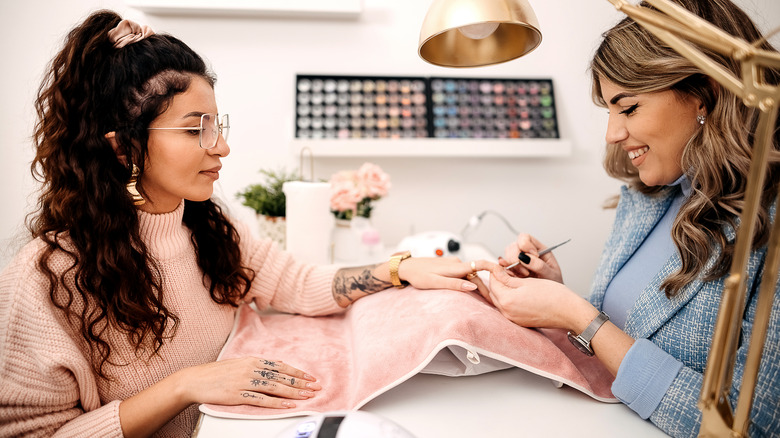
Roughly 5% of the population engages in body-focused repetitive behaviors, commonly known as BFRB. According to WebMD, these behaviors involve strong impulses prompting individuals to bite, pick, or pull at their skin, resulting in harm.
Managing excessive spending habits or refraining from stimulating activities to ensure a restful night’s sleep is relatively straightforward. However, tackling compulsive behaviors and issues centered around the body presents a more challenging task. Some of the most common BFRBs — in line with habits like picking, biting, and scratching — are trichotillomania (hair pulling), excoriation (skin picking), and onychophagia (nail biting).
Defeating these pesky habits isn’t easy, but the result is exceedingly worth it. According to psychology professor Wendy Wood, “If you want to change a behavior, then try to identify what might be a trigger that generates the behavior,” she explained to Wired.
With repetitive and body-focused habits, triggers are often rooted in anxiety and compensated for with compulsions. Lucky for us, there are a number of ways to address these issues while finding effective alternatives. Let’s jump in.
Give yourself an incentive

Instead of just harboring an intention, it can be beneficial to provide yourself with a specific reason to refrain from picking, biting, or scratching. For instance, you could paint your nails or apply acrylics, cover your arms with tight full sleeves, or wear gloves as preventive measures to minimize potential damage.
According to board-certified dermatologist and psychiatrist Dr. Amy Wechsler, “If something is covered, then it’s hard to access, and when you try to get to them but can’t, that’s enough time for you to think, Oh, I shouldn’t be doing this,” she explained to MindBodyGreen, listing a few examples herself. “Sometimes my patients will be walking around with lots of Band-Aids, but it’s the only way to heal things.”
Having an incentive that serves as a physical barrier can effectively interrupt your actions. Both the process of unlearning habits and acquiring new ones take time and repetition. If you can afford a manicure or another luxurious treatment, it might motivate you to enhance your skin care routine while enjoying a glamorous appearance.
Keep your hands busy

Engaging in hobbies can rescue you from unhealthy habits, and, more optimally, cultivating a new hobby can facilitate breaking free from an old habit. Physical activities such as walking, running, stretching, and socializing with friends can help alleviate the stressful feelings that often contribute to body-focused repetitive behaviors.
In accordance with the executive director of TLC’s Foundation for Body-Focused Repetitive Disorders, “One theory is that picking is a self-regulating behavior — it stimulates us when we are bored or sedentary (watching TV, at the computer, talking on the phone), and calms us when we are overstimulated (whether by negative emotions or stress, or positive excitement),” she explained to MBG.
With that in mind, identify a self-regulating behavior that aligns with your lifestyle and run with it. If you continue to struggle with repetitive actions while engaging in mundane hobbies, ask a friend to join you in breaking habits together (and holding both of you accountable). Essentially, avoid picking, biting, and scratching by moving your body in different and more efficient ways.
Feelings journal

When you’re prepared to delve into the core of the issue, consider investing in a feelings journal. This journal will enable you to pinpoint and confront triggers directly, gradually leading to a better understanding of coping mechanisms for overwhelming emotions.
Try developing a log system to notice, understand, and release complicated feelings — for example, “I started to do x. It was because I was feeling y. I release these feelings and will try to replace the habit with z.” While that’s just a template to get you started, feel free to go further into the action, how you’re feeling, and what it means for you to let it go.
If you’re not someone who enjoys journaling, try keeping a notepad around instead. Although there are a number of mental health benefits when you start journaling, writing in general can provide some relief and allow you to reflect. When you’re feeling a strong urge to bite, pick, or scratch, you’ll have an alternative coping mechanism on hand.
Behavioral therapy

Accessing therapy is a privilege, but if it’s within your reach, it can have remarkable effects on repetitive disorders. The TLC Foundation for Body-Focused Repetitive Disorders suggests that cognitive-behavioral therapy (CBT) can address repetitive disorders from a psychiatric perspective, assisting you in recognizing and actively modifying mental, emotional, and physical patterns triggered by stress.
Though there are a number of therapeutic approaches when it comes to CBT, habit reversal training has proven to be the most effective, per The TLC Foundation. The method approaches repetitive habits through three components that tackle awareness, response, and social support. There are many informative guides to get started on habit reversal training.
In addition, behavioral therapy tackles other methods of habit reversal, like comprehensive behavioral treatment, acceptance and commitment therapy, and dialectical behavior therapy, all of which can uniquely address patterns and habits that can be detrimental to our health. Breaking a habit — especially one that helps you manage overwhelming feelings — isn’t easy. With the right tools and resources, however, it’s still possible.
Source: women.com




















